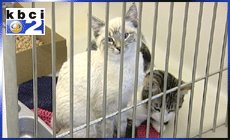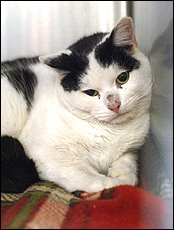The Idaho Humane Society Lends Its Support to the Demolition of a Derelict Seed Store That Claims the Lives of Dozens of Cats

Many people live under the mistaken impression that capitalists, ailurophobes, and bird-lovers are all the humans that cats have to fear in this world but that is a shortsighted view. Quite often cat-haters dressed up in the clothing of animal protectors do far greater harm to "nature's masterpieces," as da Vinci once called them, than do these other groups.
A good case in point was the recent decision of the Idaho Humane Society (IHS) to assist a wrecking crew in bringing down a vacant seed store in downtown Meridian (15 kilometers outside of Boise) on top of dozens of feral cats who had been subsisting there on a rodent population drawn to the building by the presence of leftover grain. Although neither the IHS nor the local media are willing to reveal how many cats were killed when the structure was demolished on March 21st, it is estimated that at least sixteen cats -- and probably a lot more! -- were crushed to death.
Even IHS executive director Jeff Rosenthal told the Idaho Statesman on March 20th, "You'd hope that the cats would run away when the work starts, but they'll probably just get under things and hide. A lot of animals are likely to be killed. There's no good solution." (See "Deadline Looms for Feral Cats in Building.")
To their credit, volunteers from the IHS did trap twenty-two cats (See photo above) outside the old Double D Feed and Seed building at 614 North Main Street. All of them have since been sterilized and the IHS has pledged to socialize and adopt out those capable of being domesticated and to find homes in barns for the remainder. Since many of the females rescued were in a family way, they were, presumably, aborted.
The manner in which the IHS conspired with the developers to do in the cats is another classic example of how thoroughly corrupt and fascist most -- but certainly not all -- animal protection leagues are in practice. First of all, by alleging that the building was to rickety for their volunteers to go inside, this gave the IHS a good excuse to limit its rescue operation to the area outside the building. This was not only cowardly but irresponsible as well. Any animal rescuer unwilling to put either his or her life on the line is a fraud. Can anyone imagine any fireman, policeman, or EMS worker refusing to provide assistance to those in danger just because it might put his or her life in jeopardy? The IHS' reasoning is preposterous.
Even more blameworthy was its decision to limit its rescue effort to forty-eight hours because it did not want to wait around while more kittens came into this world. "It would be nice to give people more time to catch the cats, but it's kitten season so every day that goes by there's likely to be more kittens," the merciless and calculating Rosenthal told the Idaho Statesman in the article cited supra. That sure is some attitude for a humane society to adopt!
The problem would never have arisen in the first place if the city had used its power of eminent domain to seize and then raze the building. At the very least it should have required the landlord to have removed the grain. Actually, the city is awfully lucky that the cats took up residence in the building and therefore kept the rodent population in check for all these years. If the city had had an ounce of gratitude it would have presented the building to the cats as a reward for their service to the public.
Of more immediate concern is the fate of those cats who were scattered when the building came tumbling down. Most likely they will be picked up on the street by either Animal Control or the IHS and exterminated. Not only should any such plan be blocked but the IHS should be required to verify that it has indeed found homes for the twenty-two cats that it trapped and not resorted to the expediency of extermination. Contrary to Rosenthal's lies, the IHS and other humane organizations have a potpourri of options available to them other than extermination when dealing with homeless cats.

While the cats in Meridian were being dispossessed, three-dozen felines in Brockton, Massachusetts (19 kilometers outside of Boston) were being trapped and removed from a publicly-financed old folks' home known as the Bel-Air Towers Apartment Complex. The cats, such as the one on death row shown above, were shipped to a shelter run by the Massachusetts SPCA where they will be exterminated if homes cannot be found for them in an expeditious manner.
The SPCA wanted to sterilize the felines and return them to the housing project to live out their short lives but the city has steadfastly refused to allow them to return. Jamie Segel of the SPCA told the Boston Herald on March 23rd that "Killing a colony of feral cats is like putting up a big vacant sign for other cats to move in. It's a short-term solution." (See "City Kitty Sweep Angers Activists.") That may very well be true but it is also highly probable that the inveterate ailurophobes in the Brockton Housing Authority will simply have any newcomers trapped and removed to shelters for extermination.
In the final analysis, there may not be much that the SPCA can do about the housing authority's edict, but that certainly does not mean that it has to exterminate the cats; au contraire, it should provide them with food and shelter for however long it takes to find them new homes.
Both the Brockton and Meridian cases highlight the petit fait that most public officials and animal protection personnel are not only morally bankrupt but totally unwilling to deal with feral cats in an intelligent and humane manner. The lives of all cats are precious and none of them should ever be harmed in any way. Both governments and animal rights groups have plenty of money and they should accordingly use their resources to find humane solutions for homeless cats. Of course, it is always cheaper, easier, and more fun for individuals without consciences to simply embark upon killing sprees.
Photos: KBCI, Channel 2, Boise (Meridian cats) and John Wilcox of the Boston Herald (Brockton cat).

<< Home